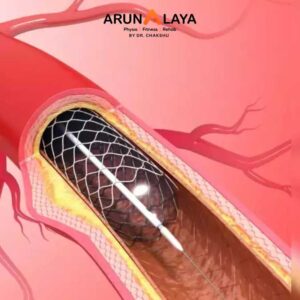After a Percutaneous Coronary Intervention Treatment In Delhi NCR.
Introduction
After percutaneous coronary intervention, such as angioplasty or stenting, patients typically undergo a recovery process to ensure the best possible outcomes.
Post-Percutaneous Coronary Intervention Care:-
- Hospital stay- Patients usually stay in the hospital for a few hours or overnight for observation.
- Medications-Patients are prescribed medications to prevent blood clots, manage symptoms, and control risk factors.
- Lifestyle Modifications
- Diet- A heart-healthy diet is recommended to manage cholesterol, blood pressure, and blood sugar levels.
- Exercise-Regular exercise, such as walking or other low-impact activities, can help improve cardiovascular health.
- Smoking cessation- Quitting smoking is essential to reduce the risk of further cardiovascular events.
- Stress management- Stress management techniques, such as meditation or yoga, can help reduce stress and promote overall well-being.
Physiotherapy
Physiotherapy plays a vital role in the rehabilitation process after percutaneous coronary intervention (PCI).
Benefits of Physiotherapy after Percutaneous Coronary Intervention (PCI):
- Improved cardiovascular fitness-Physiotherapy can help improve cardiovascular fitness, reducing the risk of future heart problems.
- Increased mobility-Physiotherapy can help patients regain mobility and strength, improving overall functional capacity.
- Reduced symptoms-Physiotherapy can help reduce symptoms such as chest pain, shortness of breath, and fatigue.
- Enhanced quality of life-Physiotherapy can improve overall quality of life, enabling patients to return to daily activities and hobbies.
Physiotherapy Interventions
- Exercise training-Exercises, such as aerobic exercise, resistance training, and flexibility exercises, can improve cardiovascular fitness and overall function.
- Breathing exercises-Breathing exercises can help improve lung function and reduce symptoms such as shortness of breath.
- Mobility and flexibility exercises-Mobility and flexibility exercises can help improve range of motion, reduce stiffness, and enhance functional capacity.
- Education and counseling-Education and counseling on lifestyle modifications, such as diet, exercise, and stress management, can help patients manage their condition and reduce risk factors.
Phases of Cardiac Rehabilitation
- Phase I-Inpatient rehabilitation, typically starting in the hospital and continuing after discharge.
- Phase II- Outpatient rehabilitation, focusing on supervised exercise and education.
- Phase III-Maintenance phase, where patients continue to exercise and manage their condition independently.
Benefits of Early Physiotherapy
- Faster recovery– Early physiotherapy can help patients recover faster and more effectively.
- Reduced complications- Early physiotherapy can help reduce the risk of complications, such as decreased mobility and increased symptoms.
BOOK AN APPOINTMENT
Working Hours
Mon - Sat: 9:00AM to 8:30PM
Sunday: 9:30AM to 7:30PM
Call Us
+91 8090080906
+91 8090080907
+91 8866991000


